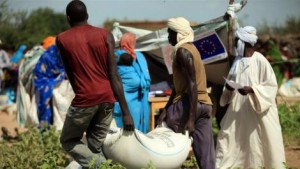Europe Attempts to Combats Hunger in Ethiopia with New Initiative
 According to a special report by euroactiv.com, the European Commission has changed tack on its approach to food security in the Horn of Africa, focusing on resilience to droughts and supporting diversification in local farming production, learning from past crises.
According to a special report by euroactiv.com, the European Commission has changed tack on its approach to food security in the Horn of Africa, focusing on resilience to droughts and supporting diversification in local farming production, learning from past crises.
The list of hunger catastrophes in the history of the Horn of Africa is long. The latest one, only two years ago, was triggered by an extreme drought.
Such extreme weather events are only expected to become more frequent with climate change, making preparedness more crucial than ever.
Anticipating those changes, the EU is trying to help affected countries deal with emergency situations. Last October, the European Commission sent an additional €50 million in aid to the southern and eastern regions of Ethiopia as part of its Supporting Horn of Africa Resilience (SHARE) programme.
The plan, presented jointly by EU Development Commissioner Andris Piebalgs and EU Commissioner for Humanitarian Aid Kristalina Georgieva, was intended to strengthen the region’s resilience against a range of potential external shocks.
In the event of a hunger catastrophe for instance, the neediest in the population should receive financial aid and food more quickly. And in the longer term, food security can be improved by promoting dietary diversification and supporting local production of vegetables, milk and animal feed.
“With this new programme, we will be helping Ethiopian people in the longer-term; providing support to help them rebuild their lives, make a living, and make sure they are well equipped to deal with droughts that will inevitably come again in the future,” explained Andris Piebalgs.
Assistance measures, financed by the EU, will be carried out by various international organizations, including UNICEF, the UN’s Food and Agriculture Organization (FAO) and the World Bank.
Concrete projects still need to be selected but a substantial portion of the EU aid money is expected to flow into the country’s Productive Safety Net Programme (PSNP), according to Willem Olthof, an Ethiopia expert at the European Commission’s development and cooperation directorate (DG Devco).
Olthof said the aid money would provide affected families with financial assistance more quickly during hunger crises. In return, aid recipients will be expected to support resilience programmes – like building dams or keeping clinics in working order. EU funds will also help improve irrigation systems and strengthen livestock assets.
“We want to strengthen Ethiopia from the ground up,” Olthof told EurActiv.de. “Not only that, but ultimately, the European taxpayers should also gain. It is much cheaper to work with a well-operating system than to have a massive humanitarian response after every crisis.”
It will be several years before the resilience projects finally produce results. Still, African governments taking part in the SHARE regional programme are constructively cooperating with the EU, Olthof said, with several already developing strategies for containing the effects of future crises following the 2011 drought.
“Two years ago, they took on the responsibility and we are reminding them of their promise,” Olthof said.
The resilience projects at the Horn of Africa are only part of the latest reorientation of European development aid. The underlying goal is to keep negative consequences of natural disasters to a minimum, a change of course made inevitable by global warming.
“Resilience is a new concept. But we want to give the approach more force,” explained Luiza Bara from DG Devco. “We observe structural explanations for crisis-susceptibility and fragility in certain developing countries. We link development cooperation and humanitarian aid together to make vulnerable population groups more crisis-resilient in the long-term.”
In 2012, the Commission drafted a ten-point plan and a complementary action plan giving higher priority to resilience in development aid. EU countries have already expressed their support and the Commission expects the Parliament to back the plan soon.
In its initiative, the Commission explicitly mentions existing projects aimed at resilience in the Horn of Africa (SHARE) and in the Sahel region (AGIR). If successful, the approach could be rolled out to other regions.
Development aid organizations are also encouraging donor countries to observe their development cooperation from a “resilience perspective” and to orient their plans accordingly.
The topic was the focus of this year’s Global Hunger Index (GHI), authored by the German World Hunger Relief Agency (Welthungerhilfe), the International Food Policy Research Institute (IFPRI) and the NGO Concern Worldwide.
Photo by European Commission